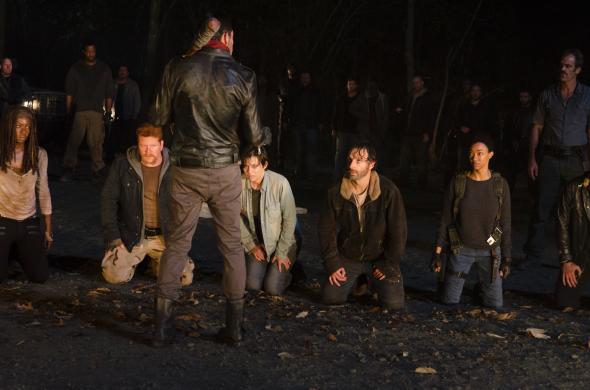This post contains spoilers for The Walking Dead’s Season 6 finale.
The Walking Dead’s sixth season ended Sunday night on a rage-inducing cliffhanger. In the 90-minute finale, Rick and his group finally come face to face with the terrifying villain Negan, who in both the original comics and the TV finale used his barbed-wire–covered baseball bat to gruesomely murder one of the group’s beloved members. In the comics, Negan killed Glenn, but we’ll have to wait until Season 7’s October premiere to find out if TV–Negan made the same decision, as the finale’s final moments adopted a first-person point of view to watch Negan swing his bat into someone’s skull without revealing who it was. Fans’ uproar could easily be written off as standard cliffhanger outrage, but it’s more than that. This has been The Walking Dead’s most formally experimental season yet, featuring a few exciting choices and many disappointing ones. Ultimately, its latter half built all of its anticipation on one moment—and that moment didn’t deliver at all.
This season has featured some innovative highs—like a premiere that deftly folded its timeline in half, using black-and-white flashbacks to help tell its story in a more meaningful way. But it’s also featured several other experimental choices that haven’t quite delivered. Earlier this season, the show dedicated an extra-long 90-minute episode to exploring the backstory of Morgan, but then relegated him to a highly confusing and contrived B-plot arc. Season 6 also introduced the show’s first on-screen lesbian relationship, but barely developed it, and then fulfilled an unfortunate trope by killing one of them off prematurely. But perhaps the most infuriating choice during this season was the finale’s cliffhanger.
Throughout the show, Glenn has been imperiled perhaps more than any other core character. Still, no close call has ever been executed quite like the episode that ended with Glenn seemingly toppling off a dumpster into a swarm of zombies only to be ripped apart and consumed, intestines-first. That harrowing moment occurred in the season’s third episode, and the suspense was dragged out until Episode 7, at which point we found out Glenn had successfully been hiding under a dumpster the whole time, and that the intestines belonged to a group-member who had fallen on top of him. In the end, this felt like a forced and unnecessary stunt that only soured fans for the even cheaper cliffhanger to come. In the context of where most fans knew this season was headed, Glenn’s dumpster dive should either have killed him, or not happened at all.
As one might guess from the title, death is often the emotional core of The Walking Dead. But when deaths and almost-deaths get the cliffhanger treatment, they tend to lose their emotional immediacy, reading less like effective narrative storytelling and more like a cynical ratings-grab. Because of the season-ending cliffhanger, when viewers find out who died at the premiere of Season 7, the initial shock of watching that much-anticipated moment and all of its dreadful build-up on-screen for the first time will be months-old. So much time will have passed since we heard the chilling monologue, saw the quick-cuts from one terrified face to another, and felt the swing of the bat.
Devoted Walking Dead fans already know what happened in the comics, but after Glenn’s fake dumpster death, killing him after yet another cliffhanger would draw eye-rolls from many fans. And from narrative standpoint, the backup choices aren’t compelling. The two most likely runner-up candidates seem to be Abraham and Daryl. The death of Abraham, an unstable tough-yet-fragile guy introduced in Season 4, wouldn’t pack much of a gut punch; this season has gifted him several inscrutable plotlines in the hopes of fleshing out an otherwise cartoonish character, to no avail. And then there’s Daryl, the buff, sweaty redneck whose hair is perpetually in his face. Like Abraham, Daryl’s death would provide little narrative meaning, since his storyline has lacked direction for several seasons: He should have been killed off a while ago, so his death wouldn’t give the season the narrative meaning it so desperately needs now. Either case—Daryl or Abraham—would feel much like a real-life apocalypse—death coming for us all, whether or not there’s any narrative meaning to it. But The Walking Dead is no nihilistic drama. At its best, it interrogates topics like redemption and honor, mourning its dead and steeping their demises in meaning. That’s why Glenn had to die, and why the writers’ commitment to a cliffhanger finale was a shame.
Glenn’s death would have actually been the perfect ending note for this season. He and Maggie are a ray of optimism within the post-apocalyptic world—especially this season, as it’s been revealed that Maggie is pregnant. The two said earlier this season that they conceived on purpose in the hope of building something meaningful—a future, against all odds. Glenn’s death would challenge whatever shred of hope this show has left for the survival of love and family as we traditionally know them.
By the finale’s close, when both Glenn and Maggie are on their knees waiting to see which of their loved ones will die, the hope they’ve come to embody seems more futile than ever—especially given Maggie’s dire medical condition, which started suddenly, as she clutched her abdomen in pain. The group’s search for a doctor to treat her is what led them straight to Negan and his men. It’s a powerful and devastating message—the very pursuit of a future, the audacity of the group’s optimism, is what led them to their captivity in the hands of a man who couldn’t care less. It would have been a great season, if the writers had only been brave enough to end it properly: with Glenn’s unambiguous death.
